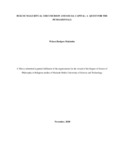BUKUSU MALE RITUAL CIRCUMCISION AND SOCIAL CAPITAL: A QUEST FORTHE FUNDAMENTALS
Abstract
Among the many African rites of passage, maleritualcircumcisionremainsone of the most important and outstanding because of thevitalelements associated with it. Many written documents on Bukusu male ritual circumcision have lookedat this rite fromvarious viewpoints such ashealth, education, and religion. Most of these studies havenot exhaustivelylooked at social capital associated with this ritual. This study seeks to fill that gap by examining Bukusu male ritual circumcision as asource of social capitaland it is concerned with the common factors as to why the Bukusu ritual of circumcision has continued despitethe opposition from various quarters.Based on the main objectives, the study first looks atthe rite of passageof male circumcisionas a process of transition; hence examine the philosophies, attitudes, and perceptions about male ritual circumcision.Secondly, the study explores the elements and meaning of social capital in reference to male ritual circumcision. Thirdly, the study investigates the role of male ritualcircumcisionin the generation of social capital in the context of social economy. Making sense of the data collected,the studyemployed social-culturaltheory. The study was donein BungomaCounty of Western Kenya, where the Bukusupeople predominantly live. Qualitative approach was used in the collectionand analysis of data from 186 respondents. Purposive and snowball samplingtechniqueswere used to identify respondents. The secondary sources of information included,library written materials like books, journals, thesis and dissertations, reports and articles.The instruments’ validity was assured by submitting them to my advisors and their reliability through a pilot study with students and a few circumcision candidates. A descriptive analysis was undertaken by bringing together, comparisons, and interpreting both primary and secondary data in the light of the objectives of this study,research questions, and theoretical framework. The findings were descriptively presented as narrated themes. The findings of this studyare an account of Bukusumale ritual circumcisionand social capital. Bukusu male ritual circumcision is inherentof immense social capital hence, transformingto conformto the social changeand economicsituation of the society.Bukusu male circumcision is a niche for social and economic development.These are an invaluable assessment tool in the evaluation of the past, present, and future perspectives of male circumcisionwith focus to social capital component. Most important, the findings are a repository for reference by future generations in scholarship and social-cultural studies

